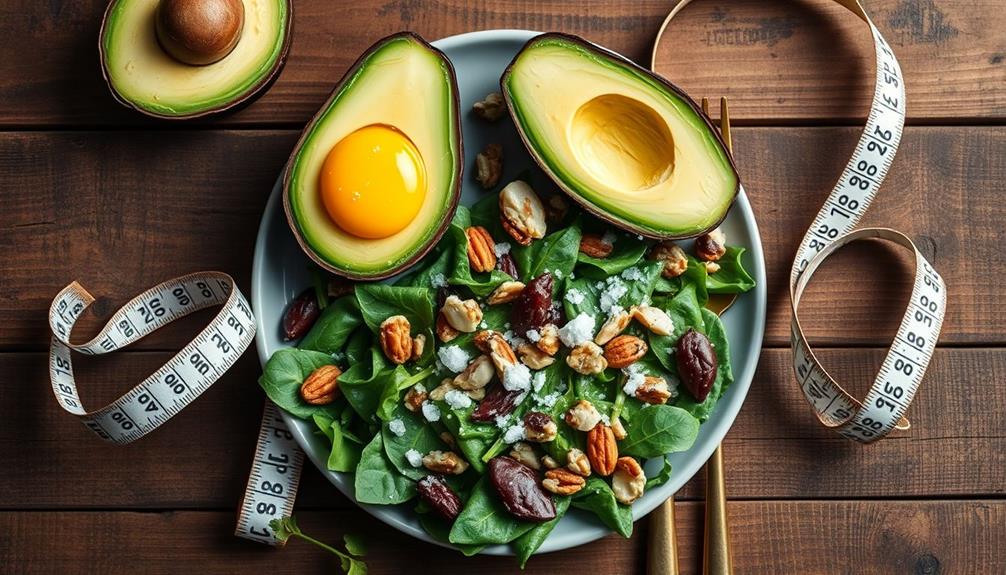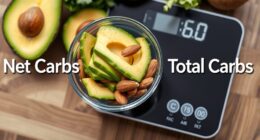Revealing the secrets of the keto nutritional pyramid helps you balance your fat, protein, and carb intake for better health and weight loss. Focus on getting 70-75% of your daily calories from healthy fats like olive oil and butter, while limiting carbs to just 5-10%. Incorporate low-carb veggies and high-quality proteins to diversify your diet, supporting your energy levels and metabolism. Be aware of potential challenges, like decreased fiber intake and "keto flu," and consider professional guidance for tailored advice. Keep exploring the essentials, and you'll discover even more strategies to make your keto journey a success. To ensure that you’re thriving on keto, it’s important to stay well-hydrated and maintain electrolyte balance, especially during the initial adjustment period. Experiment with different recipes and meal plans to find what works best for you, and don’t be afraid to seek support from the keto community or a nutritionist. By staying educated and open-minded, you can unlock the full potential of the keto nutritional pyramid and reap the benefits of improved health and vitality.
Key Takeaways
- Emphasize healthy fats, making up 70-75% of daily calories, to promote ketosis and effective weight loss.
- Limit carbohydrate intake to 5-10% of calories to enhance fat-burning and stabilize blood sugar levels.
- Include a variety of low-carb vegetables and quality proteins to prevent nutrient deficiencies and support overall health.
- Regularly assess and adjust your macronutrient ratios based on personal energy levels and hunger cues for optimal results.
- Consult a registered dietitian for personalized guidance and meal plans tailored to individual health needs and lifestyle.
Understanding the Keto Diet
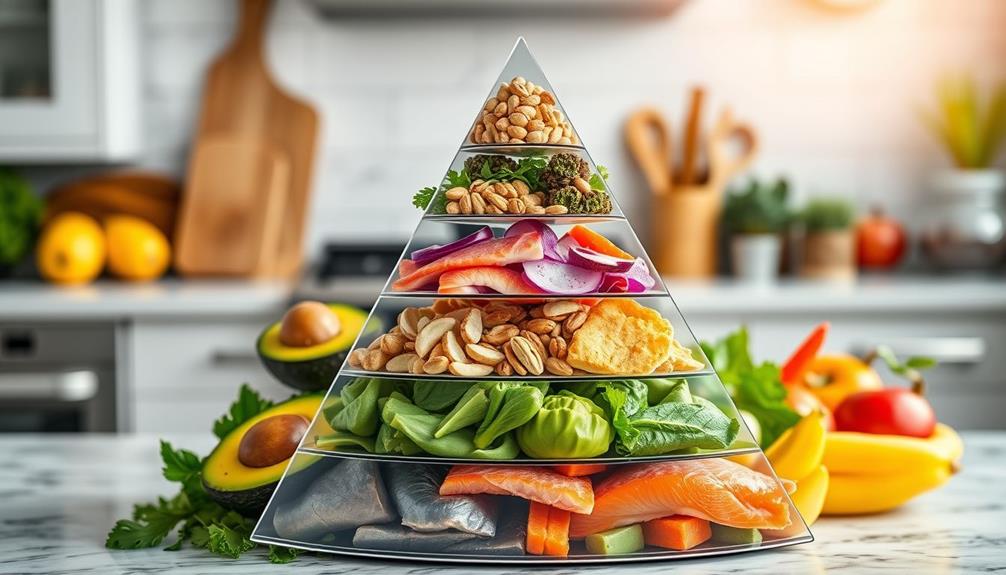
The Keto diet, with its focus on low carbs and high fats, helps your body switch from burning carbohydrates to utilizing fat for energy. This dietary approach emphasizes healthy fats like olive oil and butter, while limiting carb intake to promote ketosis.
By following the nutritional pyramid, you'll prioritize fats at the base, followed by low-carb vegetables and high-quality proteins. Incorporating a balanced diet rich in nutrients is essential for overall health, as it can support your body's metabolic processes, including effective strategies for weight loss.
Moderate dairy, nuts, and seeds guarantee you get essential nutrients while keeping carbs low. As you make this shift, your body adapts, leading to increased fat-burning and potential weight loss.
Understanding these fundamentals is key to successfully managing the Keto lifestyle and achieving your health goals. Embrace this change, and enjoy the benefits that come with it! With the proper knowledge and commitment, you can harness the benefits of ketosis to improve your overall well-being. These benefits include increased energy levels, improved mental clarity, and effective weight management. By staying educated and dedicated, you can truly thrive on the Keto lifestyle.
Key Macronutrient Ratios
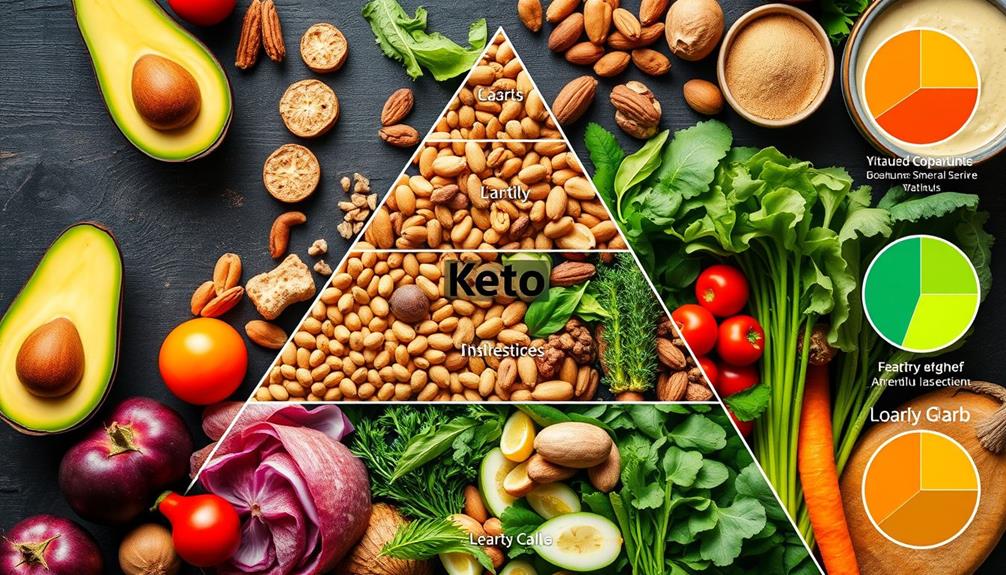
When diving into the Keto diet, understanding key macronutrient ratios is essential for success. You'll want to aim for about 70-75% of your daily calories from fats, 20-25% from proteins, and only 5-10% from carbs.
This high-fat, low-carb approach encourages your body to enter ketosis, where it burns fat for energy instead of carbohydrates.
To figure out your specific macronutrient needs, consider using a keto calculator tailored to your weight, activity level, and goals.
It's also important to regularly reassess your intake as your body changes. Tracking your macros with an app or food diary can simplify the process, helping you stay committed and on track for sustainable results in your Keto journey.
Health Benefits of Keto

Many people discover that the Keto diet offers a range of impressive health benefits. For starters, it promotes effective weight loss by shifting your body into fat-burning mode, utilizing stored fat for energy.
You'll likely experience improved insulin sensitivity, which helps stabilize blood sugar levels and reduce the risk of chronic diseases. Additionally, many report increased energy levels as your body adapts to burning fat and ketones instead of carbs, eliminating the fatigue often tied to carb-heavy diets.
This consistent energy source supports your weight management efforts, making it easier to stay active and engaged. Overall, the Keto diet can enhance your metabolic health and improve your overall well-being when followed correctly.
Nutritional Diversity Essentials
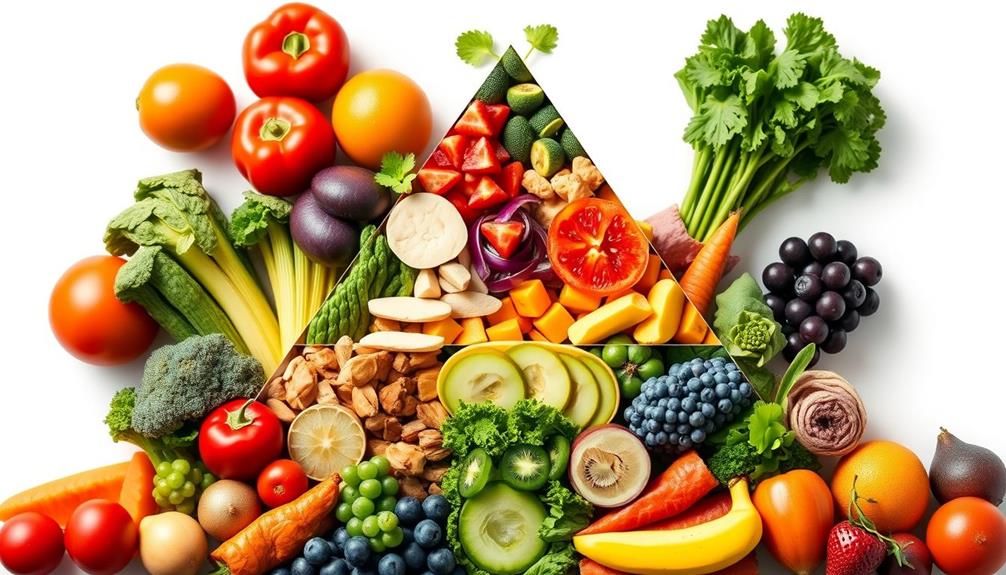
Nutritional diversity is vital for maintaining overall health on the Keto diet. Without a variety of foods, you risk nutrient deficiencies that can compromise your well-being. Incorporating different healthy fats, low-carb vegetables, and quality proteins guarantees you get a wide range of vitamins and minerals.
Think avocados, leafy greens, and fatty fish, which provide essential nutrients while keeping your carb count low.
Don't forget dairy, nuts, and seeds in moderation; they can add valuable nutrients and flavor to your meals.
Listening to your body is important, too. Pay attention to how different foods affect your energy levels and hunger cues.
Common Challenges on Keto

What hurdles might you face on the Keto diet? First, you might struggle with a significant drop in fiber intake, leading to constipation and bloating.
It's essential to monitor your fiber content and stay hydrated to support digestive health.
You could also experience symptoms of "keto flu," which can hit hard if you shift to low carbs too quickly. This can include fatigue, headaches, and irritability.
Additionally, you'll need to adapt to the new nutritional pyramid, which differs from traditional diets by emphasizing fats over carbs.
This alteration may not suit everyone, so consider your individual health needs.
Staying aware of these challenges will help you navigate the Keto journey more effectively and maintain your commitment.
Importance of Professional Guidance

Steering through the challenges of the Keto diet can be overwhelming, especially when it comes to ensuring you're meeting your nutritional needs.
That's where professional guidance becomes invaluable. A registered dietitian can help you navigate the complexities of the Keto nutritional pyramid, ensuring you maintain a balanced intake of essential nutrients.
They'll tailor meal plans that suit your health goals and lifestyle, minimizing the risk of nutrient deficiencies. With their expertise, you'll learn how to listen to your body's cues and adjust your diet accordingly.
Don't underestimate the importance of having a knowledgeable partner in your Keto journey; it can make all the difference in achieving sustainable success and ideal wellness.
Personalizing Your Keto Experience

Creating a personalized Keto experience involves understanding your unique body and its needs.
Start by calculating your macronutrient ratios, aiming for 70-75% fats, 20-25% proteins, and 5-10% carbs. Use a keto calculator tailored to your age, weight, and activity level, and reassess regularly as your body changes.
Track your food intake with user-friendly apps to stay committed and guarantee you meet your goals. Pay attention to how different foods affect your energy and hunger levels, adjusting your choices accordingly.
Remember to incorporate a variety of nutrient-dense foods to avoid deficiencies and maintain digestive health. Consulting with a registered dietitian can also provide valuable insights to further personalize your approach and enhance your overall wellbeing on Keto.
Frequently Asked Questions
Can I Eat Fruits on the Keto Diet?
You can eat fruits on the keto diet, but focus on low-carb options like berries. Limit portions to stay within your carb limits, and always prioritize nutrient-dense foods to maintain overall health and energy levels.
What Snacks Are Keto-Friendly?
For keto-friendly snacks, choose options like cheese, nuts, seeds, or low-carb vegetables with dip. You can also enjoy avocados or hard-boiled eggs. These choices keep your carb count low while satisfying your hunger.
Is Alcohol Allowed on the Keto Diet?
Yes, you can enjoy alcohol on the keto diet, but choose wisely. Opt for low-carb options like spirits or dry wines. Remember, moderation's key, as drinks can hinder your ketosis and overall progress.
How Do I Know if I'm in Ketosis?
To know if you're in ketosis, monitor your body for signs like increased energy, reduced appetite, and potential weight loss. You can also use ketone test strips for a more precise measurement of your ketone levels.
Can I Combine Keto With Intermittent Fasting?
Sure, you can have your cake and eat it too! Combining keto with intermittent fasting can boost fat loss and energy levels. Just listen to your body, stay hydrated, and adjust as needed for best results.
Conclusion
To summarize, embracing the Keto diet can transform your eating habits and overall health. By understanding the nutritional pyramid and focusing on the right macronutrient ratios, you're setting the stage for success. Don't let common challenges deter you; instead, seek professional guidance to personalize your journey. Are you ready to reveal the secrets of the Keto diet and experience its benefits for yourself? Immerse yourself, and let your body thrive on healthy fats!



